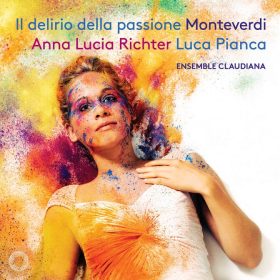There is plenty of variety too in vocal timbre, achieved with just a handful of singers.
“Il delirio della passione,” performed by Anna Lucia Richter, Luca Pianca, and Ensemble Claudiana, is Gramophone Editor’s Choice for May! Read the full review below:
For committed Monteverdians, there are no surprises in this selection. Stylistically wide-ranging in its choices, it explores the ground of the last 30 years of the composer’s long career through a carefully arranged sequence of familiar favourites.
Devotional music and lighter madrigals make their appearances but the lion’s share of attention is reserved for the operas, beginning with a rumbustious rendering of the Prologue to Orfeo (prefaced by some unscripted tambourine work), delivered at breakneck speed and spiced with a whirlwind of improvised embellishment in the final strophe. Some purists won’t like Luca Pianca’s approach to unwritten ornamentation, which allows the virtuoso members of the Ensemble Claudiana unbridled freedom, and some may cavil at his imaginative and at times almost cavalier attitude to instrumentation. But there is no doubting the freshness of Pianca’s interpretative stance, with its determination to extract every ounce of expressive potential through contrasts of speed and dynamics, and its control of textual detail.
There is plenty of variety too in vocal timbre, achieved with just a handful of singers. The final duet from Poppea (not in fact written by Monteverdi) works convincingly, with a well-matched pairing of voices (Dimitri Sinkovsky’s countertenor is refreshingly warm and full), and the Lamento della Ninfa, whose delicious opening harmonic clashes are fully exploited with some robust, muscular singing from tenors and bass, providing the perfect foil for the almost timid initial pathetic pleading of the soprano entry.
This is just one moment of many that mark out Anna Lucia Richter’s performances on this record as constituting something of a watershed in the history of Monteverdian heroines, a new and focused voice, richly varied in its tonal palette, unafraid to exploit the full gamut of human emotion so dramatically etched by the composer. Richter’s bright, clean, focused tone, precise diction and keen sense of drama will be familiar from her performances in an impressively wide-ranging portfolio, stretching from Schubert lieder to Mahler’s Wunderhorn songs, and Idomeneo to Henze’s Elegy for Young Lovers.
The heart of her achievement on this recording is undoubtedly the lament from Arianna, the only part of the opera to have survived. With its sure-footed command of the patterns and cadences of the Italian language, from Arianna’s agonised opening cry to her desperate urgent repetitions of Teseo’s name (the strong rhetorical feature that links the sections and provides emotional architecture), this is a powerful reading. It is surely the only serious competition in the catalogue to Cathy Berberian’s classic performance with Nikolaus Harnoncourt from the 1970s (now on Warner Classics).
Iain Fenlon



